

Sound recordings of British accents and dialects. Garden. A tour of the British Isles in accents. Free dialect and accent recordings for the performing arts. Sounds Familiar? What you can hear You can listen to 71 sound recordings and over 600 short audio clips chosen from two collections of the British Library Sound Archive: the Survey of English Dialects and the Millennium Memory Bank.
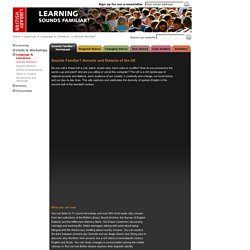
You’ll hear Londoners discussing marriage and working life, Welsh teenagers talking with pride about being bilingual and the Aristocracy chatting about country houses. You can explore the links between present-day Geordie and our Anglo-Saxon and Viking past or discover why Northern Irish accents are a rich blend of seventeenth century English and Scots. You can study changes in pronunciation among the middle classes or find out how British Asians express their linguistic identity. What you can do In addition there are interpretation and learning packages relating to the dual themes of language variation and language change within spoken English. Learn the Cockney accent with Jason Statham.
Facebook. Air New Zealand - Journal. How to Speak Cockney - Anglophenia Ep 36. Sounds Familiar? Teaching listening: an American accent. Here are two lesson plans based on a fragment of an interview with Anderson Cooper, a journalist, in which he talks about how he chose his profession (the story starts at 13m16s and ends at 16m20s).
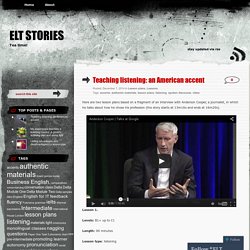
Lesson 1. Levels: B1+ up to C1 Length: 90 minutes Lesson type: listening Materials: Worksheet (docx)/ Worksheet (pdf), Teacher’s notes (docx)/ Teacher’s notes (pdf) This is a primarily listening lesson in which the students will practice their decoding skills. If time permits, the students can share their own answers to the questions Anderson Cooper replied to. Lesson 2. A Brief Clarification About New Zealand Accents. (Wikimedia) I want to quickly clear something up about New Zealand accents, since the topic was touched upon briefly yesterday.
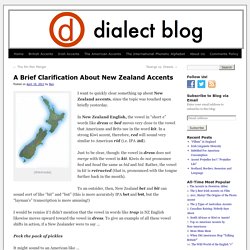
In New Zealand English, the vowel in “short e” words like dress or bed moves very close to the vowel that Americans and Brits use in the word kit. In a strong Kiwi accent, therefore, red will sound very similar to American rid (i.e. IPA ɹɪd). Just to be clear, though: the vowel in dress does not merge with the vowel in kit. To an outsider, then, New Zealand bet and bit can sound sort of like “bit” and “but” (this is more accurately IPA bet and bɘt, but the “layman’s” transcription is more amusing!)
I would be remiss if I didn’t mention that the vowel in words like trap in NZ English likewise moves upward toward the vowel in dress. Peck the pack of pickles It might sound to an American like … Pick the peck of puckles (In IPA, this would be pek ðə pɛk əv pɘkɫz.) This little quirk is the biggest difference between Australian English and New Zealand English. P.S. Australian Voices. Click on the map to hear voices from different parts of Australia.
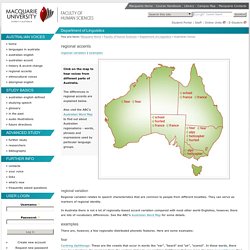
The differences in regional accents are explained below. Also visit the ABC's Australian Word Map to find out about Australian regionalisms - words, phrases and expressions used by particular language groups. regional variation Regional variation relates to speech characteristics that are common to people from different localities. They can serve as markers of regional identity.
In Australia there is not a lot of regionally-based accent variation compared with most other world Englishes, however, there are lots of vocabulary differences. There are, however, a few regionally-distributed phonetic features. Fear Centring diphthongs: These are the vowels that occur in words like "ear", "beard" and "air", "scared".
Salary vs. celery For many young speakers from Victoria, the first vowel in "celery" and "salary" are the same, so that both words sound like "salary". School. The 3 Types of Australian Accents. The Australian Accent is renowned for its lack of regional differences.
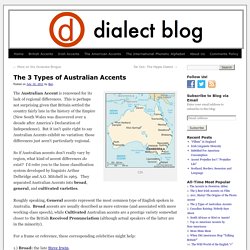
This is perhaps not surprising given that Britain settled the country fairly late in the history of the Empire (New South Wales was discovered over a decade after America’s Declaration of Independence). But it isn’t quite right to say Australian Accents exhibit no variation: those differences just aren’t particularly regional. So if Australian accents don’t really vary by region, what kind of accent differences do exist? I’d refer you to the loose classification system developed by linguists Arthur Delbridge and A.G.
Mitchell in 1965. Roughly speaking, General accents represent the most common type of English spoken in Australia. For a frame or reference, these corresponding celebrities might help: 1.) You may disagree with my judgements here, and that’s fine.* Australian English is clearly a continuum, and these three categories are rough markers on that continuum. The results are not terribly surprising.